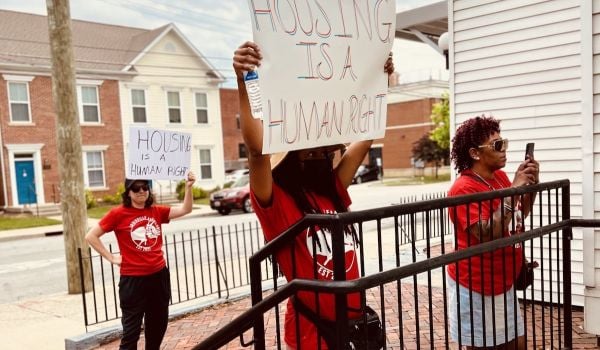Annual rent increases in California apartment buildings will be capped under a new law passed by state lawmakers last week. The bill, which limits yearly rent increases to 5 percent plus inflation, or a maximum of 10 percent, was approved about a year after California voters rejected a ballot measure that would have allowed cities to expand rent-control policies of their own. It represents another chapter in the resurgent campaign for rent regulation in the United States.
The bill was introduced by Assemblymember David Chiu, of San Francisco, who has authored other housing bills, including the first state law aimed at protecting undocumented tenants from harassment and retaliation by their landlords. The rent cap would apply to most rental units built 15 years ago or more, except for those in single-family homes, or in duplexes in which the owner occupies one of the units. Over the last year, inflation in San Francisco and Los Angeles was between 2.7 percent and 3 percent, as measured by the Consumer Price Index. So under the new law, landlords could raise rents 7.7 or 8 percent for the year, or about $160 per month on a $2,000-a-month apartment.
The bill also includes a “just cause” provision, barring landlords from evicting tenants except for certain listed reasons, like failure to pay rent or engaging in criminal activity in the apartment. In any event, the law requires landlords to include the written reason for the eviction in the eviction notice. If they are removing a tenant for a “no-fault” eviction — such as intending to let the unit to a relative or to demolish the building — landlords are required to pay the tenant one month’s rent for relocation assistance or waive the final month’s rent on their lease.
California Governor Gavin Newsom is expected to sign the bills, calling them “the strongest package [of renter protections] in America” in a statement released after the legislature’s vote.
“These anti-gouging and eviction protections will help families afford to keep a roof over their heads, and they will provide California with important new tools to combat our state’s broader housing and affordability crisis,” Newsom said.
Already this year, state lawmakers in New York and Oregon have passed substantial bills creating new regulations on rental property. In New York, new laws allow cities around the state to create their own rent-control policies when apartment vacancy rates dip below 5 percent. In February, Oregon became the first state with a statewide rent stabilization policy, capping annual rent increases at 7 percent. California’s bill is much closer to Oregon’s than New York’s.
In the weeks before its passage, prominent opponents like the California Apartment Association — which led the campaign against the rent-control ballot measure that failed last year — agreed to drop its opposition to the statewide rent cap.
That may be because the law isn’t such a bad deal for landlords. The Real Deal Los Angeles reported that, because of the exemption for buildings constructed in the last 15 years and other limitations, some experts believe the law actually gives landlords some level of certainty about what to expect in terms of rent.
Also, CalMatters reporter Matt Levin, who also co-hosts the “Gimme Shelter” podcast about the California housing crisis, reported in a rundown of the new law that most developers don’t seem to believe it will cause a slowdown in construction, which is one of the most common fears about unintended consequences of rent regulation. Levin also wrote that the California Apartment Association’s acquiescence to the rent cap may give it an advantage in the fight against the next rent-control expansion effort — which fellow Gimme Shelter co-host Liam Dillon wrote about in the LA Times earlier this summer — because it can claim that the state already agreed to a compromise.
Others noted potential issues with the law. One landlord wrote in a letter to The San Diego Union-Tribune that the law could essentially guarantee that landlords impose the maximum legal rent increase every year to avoid falling behind the market and not being able to catch up in one swoop. “Oh, great, now I have to raise rents 5 percent plus inflation (now at about 2 percent) instead of the usual 4 percent in order to keep value in my property in case I want to sell it.”
One Newsweek columnist wrote that the law would kill development momentum and constrict supply even further (seeming not to heed the lack of concern from developers). The conservative City Journal also published a piece saying that rent control would lead to a degradation of the housing stock while only being a benefit to incumbent renters.
Meanwhile, tenant groups around the country are continuing to push for more — and more stringent — rent-control policies, including at the national level. Fights about housing policy have been most heated at the state and local levels for years. But as housing becomes less affordable all over the country, advocacy groups are increasingly pushing for a national response. Vermont Senator and Democratic presidential candidate Bernie Sanders is the latest to endorse a national cap on rent increases, outlining a $2.5 trillion housing plan in a Las Vegas speech last weekend while referring to his own childhood in a rent-controlled apartment in Brooklyn, according to The New York Times.
This article is part of Backyard, a newsletter exploring scalable solutions to make housing fairer, more affordable and more environmentally sustainable. Subscribe to our weekly Backyard newsletter.

Jared Brey is Next City's housing correspondent, based in Philadelphia. He is a former staff writer at Philadelphia magazine and PlanPhilly, and his work has appeared in Columbia Journalism Review, Landscape Architecture Magazine, U.S. News & World Report, Philadelphia Weekly, and other publications.
Follow Jared .(JavaScript must be enabled to view this email address)


















